Using everyday language to talk about size and position, comparing and ordering by size
Counting in ones and twos
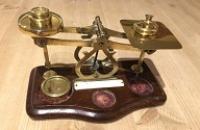
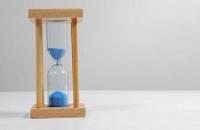
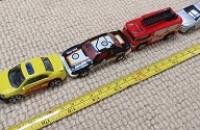
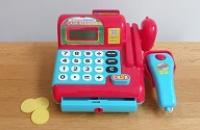
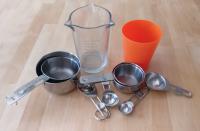
Children often enjoy finding matching pairs and pegging things up.
Adults could provide a collection of socks of different sizes (including dolls', baby and adult socks, long socks and short socks) to sort into pairs.
The Activity
Set up a long washing line with pegs and a washing basket of different sized socks, so that children can find pairs and peg them up. For this activity the focus is on size and length, rather than colour or pattern, providing opportunities for comparing and ordering. Using socks which are the same colour and have the same pattern, but are different sizes, will help children move on from attending just to colour. You could also include some odd socks.
Encouraging mathematical thinking and reasoning:
Describing
Tell me about the socks you've found/sorted out/put on the line already.
Why do you think those aren't a pair?
Where do you think these ones should go?
Reasoning
Have we got room for any more? Have we got enough pegs?
Is that the longest sock? Are you sure?
Why do you think those don't go there?
Opening Out
Have we got enough socks for all these dolls? How can we find out?
What if we order all the socks going from the baby ones to the biggest ones?
Can we count them in twos? What do you notice when you count in twos?
How many pairs of baby socks are there?
Recording
Can you think of a way to show how many of each kind of sock we have, so we can check that we haven't lost any?
The Mathematical Journey
Counting:
- remembering the number sequence, saying one number for each object
- cardinality - the last number tells you how many there are
- counting in twos
- counting pairs as units
Pattern:
- noticing the alternating pattern when counting in twos
Measures:
- using language to compare size e.g. bigger, smaller, longer, shorter, much/a little longer/shorter
Shape and space:
- using positional language e.g. next to, between, after, before...
Development and Variation
Children could peg all the pairs up in size order.
They could find socks for dolls or teddies, or for the members of their families.
They could start a sock shop, pricing the pairs of socks in pounds and paying with plastic pound coins.
Resources
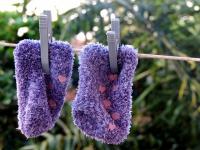
A collection of socks, including baby and adult socks, long and short socks, and some odd ones.
Washing line and clothes pegs.
A number line to help children count in twos.
Download a PDF of this resource.
Acknowledgement: Helen J Williams

